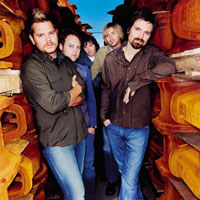 Recently I was checking some concert schedules to see if my favorite Christian musicians are touring this summer. My family and I love Third Day’s current stuff and we’re nostalgic for the likes of Michael W. Smith and Steven Curtis Chapman. There’s a really cool Christian night club in Cincinnati so we also get to see a lot of young, new bands.
Recently I was checking some concert schedules to see if my favorite Christian musicians are touring this summer. My family and I love Third Day’s current stuff and we’re nostalgic for the likes of Michael W. Smith and Steven Curtis Chapman. There’s a really cool Christian night club in Cincinnati so we also get to see a lot of young, new bands.
And then I ran across one of the more surprising and uninspiring headlines: “Christian Music Industry is Dying.” And the post went even further to suggest that the Christian film industry might not be very far behind. Hmm, what to feel about this?
S. David Acuff’s post at Wired 4 Film’s site reflected a sobering viewpoint. (Wired 4 Film, by the way, sees itself as a “movement to create paths out of the ‘ghetto’ or what Phil Cooke calls the ‘Christian Bubble’ and into the marketplace…”
Citing Scott McClelland’s Collide magazine piece, Acuff pointed to five reasons why the Christian music industry is dying:
• “The major labels aren’t in danger of going under anytime soon, but they’ll be forced to depend on dwindling revenue from their song catalogues
• “The term CCM, or Contemporary Christian Music, will go away.
• “Christian music that matters won’t have any affiliation with the Christian Music industry but instead will be written, recorded and released in the mainstream.
• “Worship music serves a purpose within the church, which guarantees its survival
• “The big names from CCM’s glory days (Michael W. Smith, Amy Grant, Steven Curtis Chapman, etc.) will survive but many artists from the last decade will be left looking for a reason, roaming through the night to find their place in the world.”
Wow! I sure hope he’s right! In my mind, having a Christian music industry creates a feeling that the concerts are for church-goers and amount to sort of a Holy Huddle. The best and brightest of musicians–in my view–ought to be playing to audiences of all backgrounds, and the music should stand up against anything else that’s out there, Christian or otherwise. I have such respect for acts like Nickelback and Faith Hill, where faith-based music isn’t labeled “Christian.” If Third Day didn’t have the label, I think so, so many more people–especially young people would be exposed to their songs, and they’d love ’em!
The idea of faith-based guys (or gals!) forming bands to play for general (secular?) audiences is not a new one. “U2” is the most current and famous. “Kansas” (think “Dust in the Wind,” “Carry On My Wayward Son”) was one of my early favorites.
The end of the Christian music industry may or may not be coming. But the end of the industry doesn’t mean the music will die. In fact, it may play to a wider audience and have a deeper impact.


